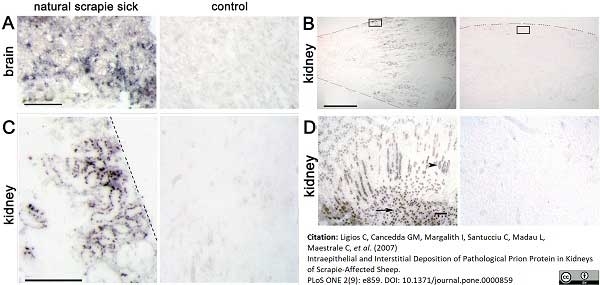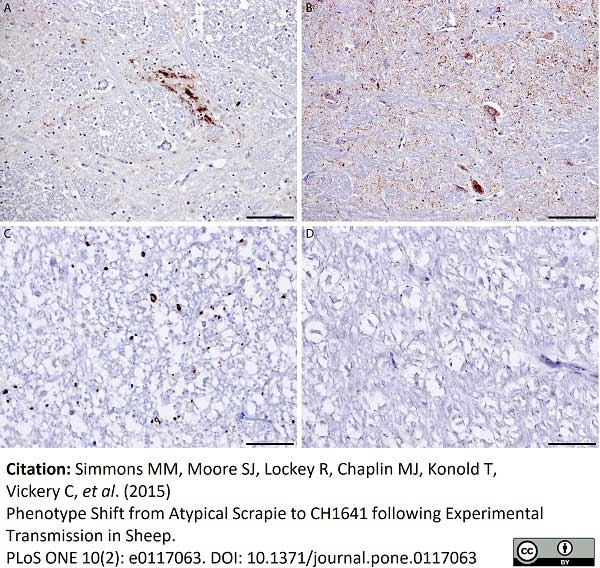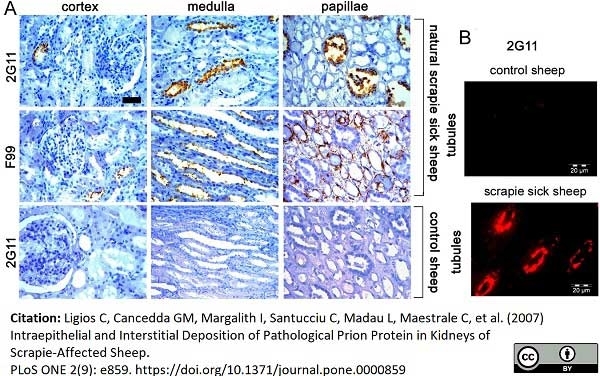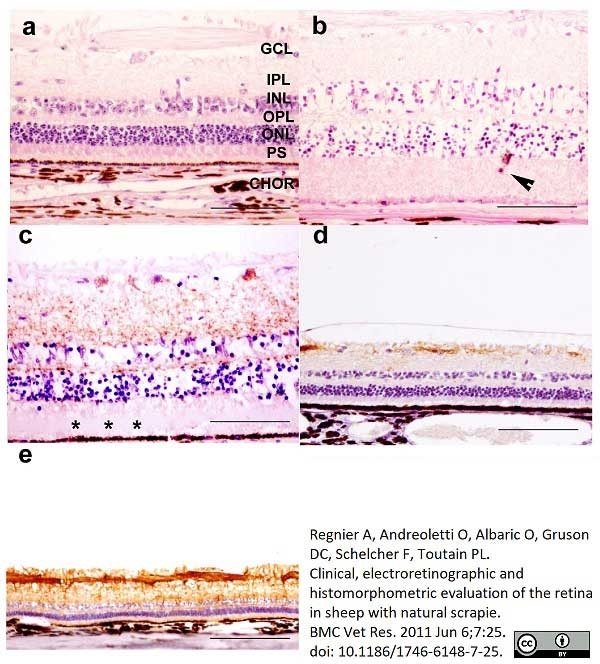CD230 (aa151 - aa159) antibody | 2G11




Mouse anti Sheep CD230 (aa151 - aa159)
- Product Type
- Monoclonal Antibody
- Clone
- 2G11
- Isotype
- IgG2a
- Specificity
- CD230 (aa151 - aa159)
| Mouse anti Sheep CD230 (aa151 - aa159) antibody, clone 2G11 recognizes CD230 and can be used to detect the plaques which are formed during the progression of prion disease. Transmissible spongiform encephalopathies (TSEs) or prion diseases are fatal infectious neurodegenerative diseases of humans and animals. These diseases are biologically unique, as they are believed by some to be transmitted by an infectious agent comprised only of protein, with no nucleic acid component. Clinically, these diseases present with motor disturbances and behavioural changes. The major pathological changes seen are neuronal loss, vacuolation (spongiform change), proliferation and branching of glial cells, astrocytic proliferation and accumulation of the prion protein PrPSc, which can form amyloid plaques. CD230. also known as the prion protein (PrP) exists in two alternate forms; a normal cellular form (PrPc) and a disease-associated form (PrPSc).The normal and pathological forms of the prion protein have identical amino acid sequences and differ only in their folded tertiary structure and biochemical properties. MCA2460 was raised against a synthetic peptide (146-R154R171-182 ) of the ovine PrP peptide and specifically recognises the R151-R159 sequence. |
- Target Species
- Sheep
- Product Form
- Purified IgG - liquid
- Preparation
- Purified IgG prepared by affinity chromatography on Protein A from tissue culture supernatant
- Buffer Solution
- Phosphate buffered saline
- Preservative Stabilisers
0.09% Sodium Azide - Carrier Free
- Yes
- Immunogen
- Synthetic peptide 146-R154R171-182 of ovine PrP.
- Approx. Protein Concentrations
- IgG concentration 1.0 mg/ml
- Regulatory
- For research purposes only
- Guarantee
- 12 months from date of despatch
Avoid repeated freezing and thawing as this may denature the antibody. Storage in frost-free freezers is not recommended.
| Application Name | Verified | Min Dilution | Max Dilution |
|---|---|---|---|
| ELISA | 1/50 | 1/1000 | |
| Immunohistology - Paraffin 1 |
- 1Treatment of tissue sections in 98% formic acid, for 30 minutes, is recommended prior to pre-treatment with trypsin at 37oC for 5 minutes followed by heat mediated retrieval with 10mM citrate buffer pH6.0 See Andreoletti 2000.
- ELISA
- Tested on peptide.
References for CD230 (aa151 - aa159) antibody
-
Andréoletti, O. et al. (2000) Early accumulation of PrP(Sc) in gut-associated lymphoid and nervous tissues of susceptible sheep from a Romanov flock with natural scrapie.
J Gen Virol. 81 (Pt 12): 3115-26. -
Andréoletti, O. et al. (2002) Phenotyping of protein-prion (PrPsc)-accumulating cells in lymphoid and neural tissues of naturally scrapie-affected sheep by double-labeling immunohistochemistry.
J Histochem Cytochem. 50 (10): 1357-70. -
Borner, R. et al. (2011) Early behavioral changes and quantitative analysis of neuropathological features in murine prion disease: stereological analysis in the albino Swiss mice model.
Prion. 5 (3): 215-27. -
Ortiz-Pelaez, A. et al. (2015) Allelic variants at codon 146 in the PRNP gene show significant differences in the risk for natural scrapie in Cypriot goats.
Epidemiol Infect. 143 (6): 1304-10. -
Simmons, M.M. et al. (2015) Phenotype shift from atypical scrapie to CH1641 following experimental transmission in sheep.
PLoS One. 10 (2): e0117063.
- Synonyms
- Prion Protein
- RRID
- AB_808711
- UniProt
- P23907
- Entrez Gene
- PRNP
- GO Terms
- GO:0005886 plasma membrane
- GO:0005507 copper ion binding
- GO:0005794 Golgi apparatus
- GO:0008017 microtubule binding
- GO:0031225 anchored to membrane
- GO:0051260 protein homooligomerization
MCA2460
If you cannot find the batch/lot you are looking for please contact our technical support team for assistance.
Please Note: All Products are "FOR RESEARCH PURPOSES ONLY"
View all Anti-Sheep ProductsAlways be the first to know.
When we launch new products and resources to help you achieve more in the lab.
Yes, sign me up


